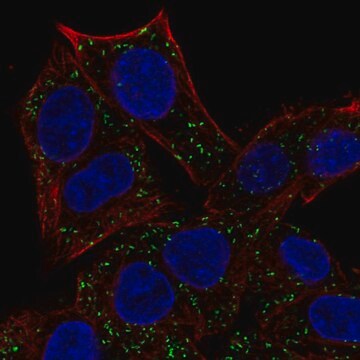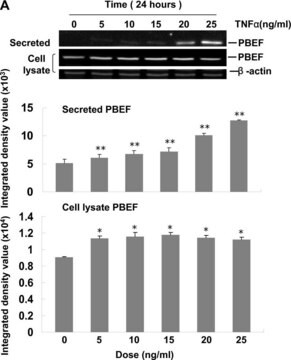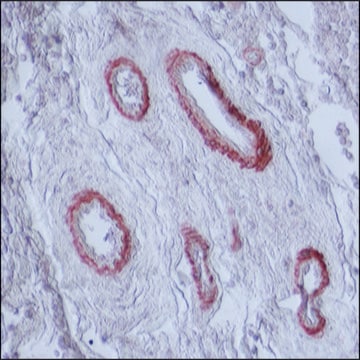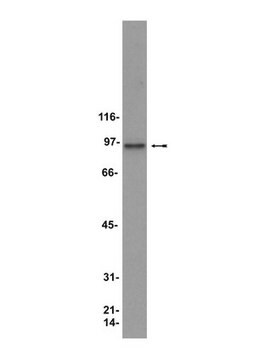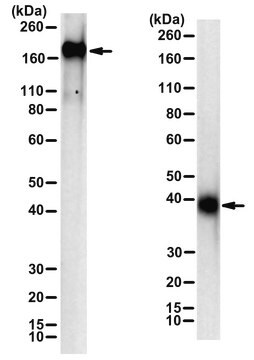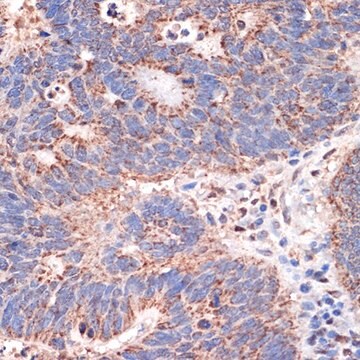MABC953
Anti-Prohibitin-2/PHB2 Antibody, clone 7F8E3
clone 7F8E3, from rat
Synonyme(s) :
Prohibitin-2, B-cell receptor-associated protein BAP37, D-prohibitin, Repressor of estrogen receptor activity, Prohibitin-2/PHB2
About This Item
Produits recommandés
Source biologique
rat
Niveau de qualité
Forme d'anticorps
purified immunoglobulin
Type de produit anticorps
primary antibodies
Clone
7F8E3, monoclonal
Espèces réactives
rat, monkey, human, mouse
Technique(s)
immunocytochemistry: suitable
immunohistochemistry: suitable (paraffin)
western blot: suitable
Isotype
IgG2aκ
Numéro d'accès NCBI
Numéro d'accès UniProt
Conditions d'expédition
wet ice
Modification post-traductionnelle de la cible
unmodified
Informations sur le gène
human ... PHB2(11331)
Description générale
Spécificité
Immunogène
Application
Apoptosis & Cancer
Apoptosis - Additional
Immunocytochemistry Analysis: 4 µg/mL from a representative lot detected Prohibitin-2/PHB2 in A431 and HUVEC cells.
Immunohistochemistry Analysis: A 1:1,000 dilution from a representative lot detected Prohibitin-2/PHB2 in human breast and mouse liver tissue.
Immunohistochemistry Analysis: A representative lot detected upregulated Prohibitin-2 immunoreactivity at the glutathione S-transferase placental-form–positive (GST-P+) hepatocellular carcinoma (HCC) foci in frozen liver sections from rats subjected to hepatocarcinogenesis induction by N-nitrosodiethylamine (DEN) and Phenobarbital (PB) treatment (Kakehashi, A., et al. (2011). Toxicol Sci. 119(1):61-72).
Qualité
Western Blotting Analysis: 0.5 µg/mL of this antibody detected Prohibitin-2/PHB2 in 10 µg of rat C6 glioma cell lysate.
Description de la cible
Forme physique
Stockage et stabilité
Autres remarques
Clause de non-responsabilité
Vous ne trouvez pas le bon produit ?
Essayez notre Outil de sélection de produits.
Code de la classe de stockage
12 - Non Combustible Liquids
Classe de danger pour l'eau (WGK)
WGK 1
Point d'éclair (°F)
Not applicable
Point d'éclair (°C)
Not applicable
Certificats d'analyse (COA)
Recherchez un Certificats d'analyse (COA) en saisissant le numéro de lot du produit. Les numéros de lot figurent sur l'étiquette du produit après les mots "Lot" ou "Batch".
Déjà en possession de ce produit ?
Retrouvez la documentation relative aux produits que vous avez récemment achetés dans la Bibliothèque de documents.
Notre équipe de scientifiques dispose d'une expérience dans tous les secteurs de la recherche, notamment en sciences de la vie, science des matériaux, synthèse chimique, chromatographie, analyse et dans de nombreux autres domaines..
Contacter notre Service technique

